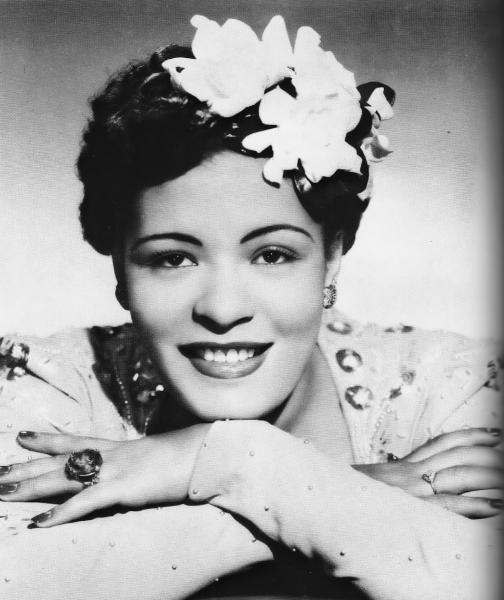Behind me, Billie was on her last song. I picked up the refrain, humming a few bars. Her voice sounded different to me now. Beneath the layers of hurt, beneath the ragged laughter, I heard a willingness to endure. Endure- and make music that wasn't there before. Barack Obama

My first exposure to Billie Holiday's music was probably through a quite memorable car advertisement than ran back in the early 90s. So distinctive was her voice that I can still conjure up the advertisement in question. (Some kudos then to the ad men but unfortunately for them I couldn't remember the brand!) One can only imagine the impact her voice had on ears of the listeners who first heard her back in the 1930s..
Her early life was, to say the least, chaotic and full of serious adversity. After a few years trying her luck in various clubs in New York in the late 20s and early 30s she was picked up by John Hammond and began her recording career with Benny Goodman. Her first recordings were fairly unremarkable but she eventually began to find her own distinct style and phrasing, the like of which had not been heard before. Goodman himself was to remark, "she was the first girl singer I'd come across who actually sang like an improvising jazz genius". Her first real hit was the song What A Little Moonlight Can Do recorded with Teddy Wilson's Orchestra. With accompaniment by Ben Webster, Roy Eldridge, Cozy Cole and Goodman it is real gem.
It was at this time that she began her musical association with Lester Young who was to give her her lasting moniker "Lady Day". (Not to be outdone she called him "Prez".). This Year's Kisses is a fantastic example of the type of recordings the two were to make together at the end of the 30s.
It was around this time that she was to record the haunting track Strange Fruit. Originally written as a poem by Abel Meeropol, it was a favourite at the integrated nightclub, Cafe Society in New York. A song about southern lynchings it is an ominously dark song that perfectly suited Holiday´s delivery.
Her star continued to ascend in the 1940's with a number of instantly recognisable hits. However her life was taking the opposite turn. She had frequent run-ins with the law and her drug habit was spiralling out of control. As was her voice. Some find her last recordings to be remarkably inferior to her earlier work. Others can find a lot of soul and heartfelt emotion in her scratchy delivery. Her final album Lady In Satin, released in 1957, divides such opinon and is a controversial work.
One of her most famous appearances was in the CBS special The Sound Of Jazz from 1957. Here is a simply stunning performance of Fine And Mellow with accompaniment from none other than Coleman Hawkins, Ben Webster; Gerry Mulligan, Vic Dickenson, Roy Eldridge and of course Lester Young. (Lester is the one sitting during this performance but he stands to give his solo. The way that Holiday looks at him would melt the the stoniest of hearts. All the more poignant as both were to pass away within two years of the recording.)
No comments:
Post a Comment